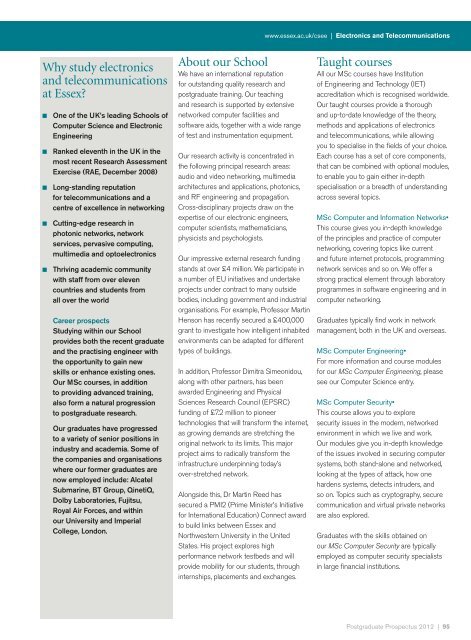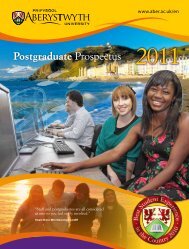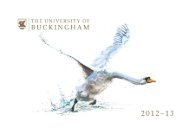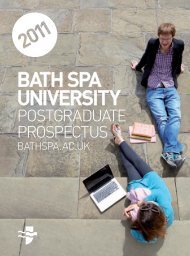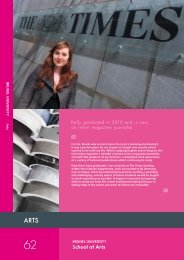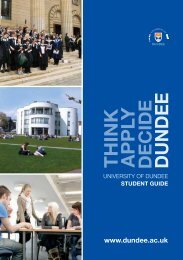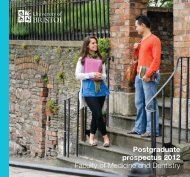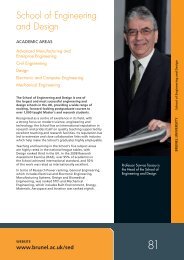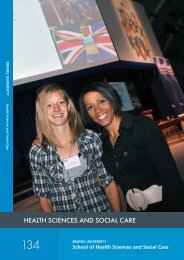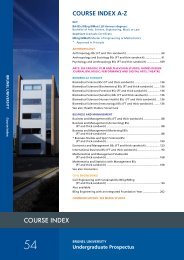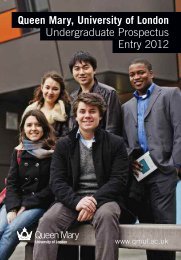Postgraduate Prospectus
Postgraduate Prospectus
Postgraduate Prospectus
You also want an ePaper? Increase the reach of your titles
YUMPU automatically turns print PDFs into web optimized ePapers that Google loves.
www.essex.ac.uk/csee | Electronics and Telecommunications<br />
Why study electronics<br />
and telecommunications<br />
at Essex?<br />
n<br />
n<br />
n<br />
n<br />
n<br />
One of the UK’s leading Schools of<br />
Computer Science and Electronic<br />
Engineering<br />
Ranked eleventh in the UK in the<br />
most recent Research Assessment<br />
Exercise (RAE, December 2008)<br />
Long-standing reputation<br />
for telecommunications and a<br />
centre of excellence in networking<br />
Cutting-edge research in<br />
photonic networks, network<br />
services, pervasive computing,<br />
multimedia and optoelectronics<br />
Thriving academic community<br />
with staff from over eleven<br />
countries and students from<br />
all over the world<br />
Career prospects<br />
Studying within our School<br />
provides both the recent graduate<br />
and the practising engineer with<br />
the opportunity to gain new<br />
skills or enhance existing ones.<br />
Our MSc courses, in addition<br />
to providing advanced training,<br />
also form a natural progression<br />
to postgraduate research.<br />
Our graduates have progressed<br />
to a variety of senior positions in<br />
industry and academia. Some of<br />
the companies and organisations<br />
where our former graduates are<br />
now employed include: Alcatel<br />
Submarine, BT Group, QinetiQ,<br />
Dolby Laboratories, Fujitsu,<br />
Royal Air Forces, and within<br />
our University and Imperial<br />
College, London.<br />
About our School<br />
We have an international reputation<br />
for outstanding quality research and<br />
postgraduate training. Our teaching<br />
and research is supported by extensive<br />
networked computer facilities and<br />
software aids, together with a wide range<br />
of test and instrumentation equipment.<br />
Our research activity is concentrated in<br />
the following principal research areas:<br />
audio and video networking, multimedia<br />
architectures and applications, photonics,<br />
and RF engineering and propagation.<br />
Cross-disciplinary projects draw on the<br />
expertise of our electronic engineers,<br />
computer scientists, mathematicians,<br />
physicists and psychologists.<br />
Our impressive external research funding<br />
stands at over £4 million. We participate in<br />
a number of EU initiatives and undertake<br />
projects under contract to many outside<br />
bodies, including government and industrial<br />
organisations. For example, Professor Martin<br />
Henson has recently secured a £400,000<br />
grant to investigate how intelligent inhabited<br />
environments can be adapted for different<br />
types of buildings.<br />
In addition, Professor Dimitra Simeonidou,<br />
along with other partners, has been<br />
awarded Engineering and Physical<br />
Sciences Research Council (EPSRC)<br />
funding of £7.2 million to pioneer<br />
technologies that will transform the internet,<br />
as growing demands are stretching the<br />
original network to its limits. This major<br />
project aims to radically transform the<br />
infrastructure underpinning today’s<br />
over-stretched network.<br />
Alongside this, Dr Martin Reed has<br />
secured a PMI2 (Prime Minister’s Initiative<br />
for International Education) Connect award<br />
to build links between Essex and<br />
Northwestern University in the United<br />
States. His project explores high<br />
performance network testbeds and will<br />
provide mobility for our students, through<br />
internships, placements and exchanges.<br />
Taught courses<br />
All our MSc courses have Institution<br />
of Engineering and Technology (IET)<br />
accreditation which is recognised worldwide.<br />
Our taught courses provide a thorough<br />
and up-to-date knowledge of the theory,<br />
methods and applications of electronics<br />
and telecommunications, while allowing<br />
you to specialise in the fields of your choice.<br />
Each course has a set of core components,<br />
that can be combined with optional modules,<br />
to enable you to gain either in-depth<br />
specialisation or a breadth of understanding<br />
across several topics.<br />
MSc Computer and Information Networks•<br />
This course gives you in-depth knowledge<br />
of the principles and practice of computer<br />
networking, covering topics like current<br />
and future internet protocols, programming<br />
network services and so on. We offer a<br />
strong practical element through laboratory<br />
programmes in software engineering and in<br />
computer networking.<br />
Graduates typically find work in network<br />
management, both in the UK and overseas.<br />
MSc Computer Engineering•<br />
For more information and course modules<br />
for our MSc Computer Engineering, please<br />
see our Computer Science entry.<br />
MSc Computer Security•<br />
This course allows you to explore<br />
security issues in the modern, networked<br />
environment in which we live and work.<br />
Our modules give you in-depth knowledge<br />
of the issues involved in securing computer<br />
systems, both stand-alone and networked,<br />
looking at the types of attack, how one<br />
hardens systems, detects intruders, and<br />
so on. Topics such as cryptography, secure<br />
communication and virtual private networks<br />
are also explored.<br />
Graduates with the skills obtained on<br />
our MSc Computer Security are typically<br />
employed as computer security specialists<br />
in large financial institutions.<br />
<strong>Postgraduate</strong> <strong>Prospectus</strong> 2012 | 95


